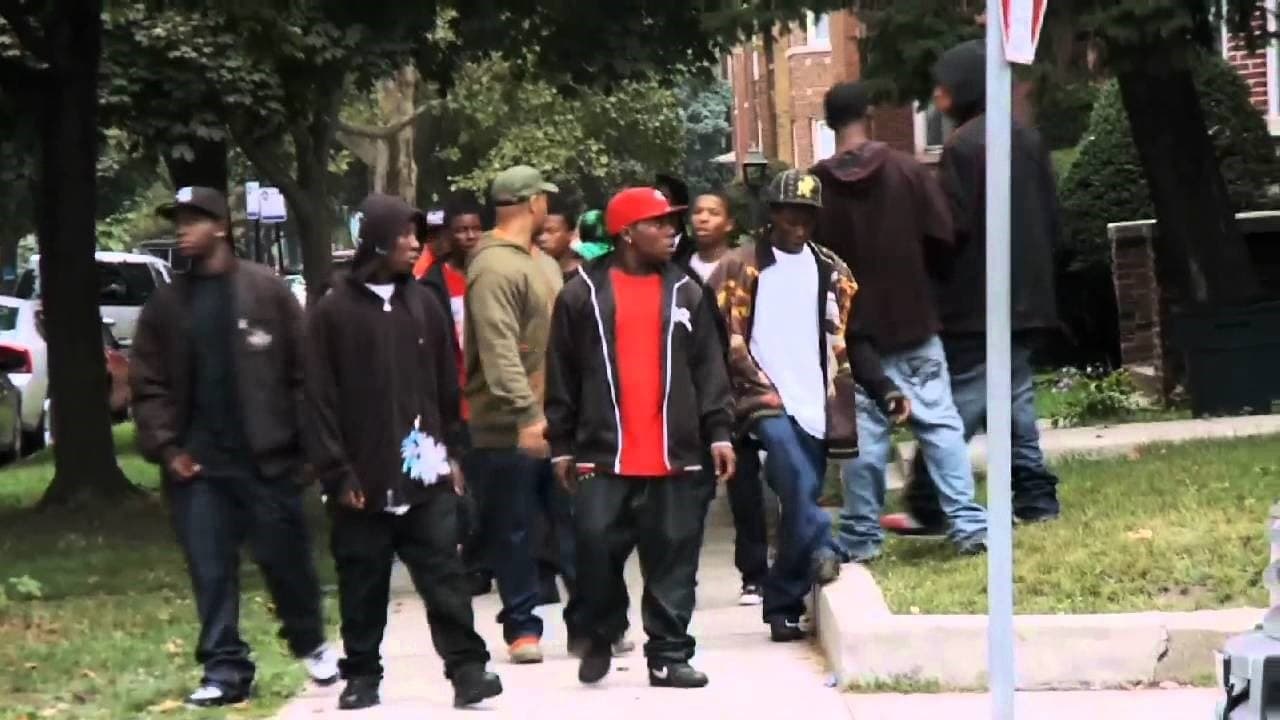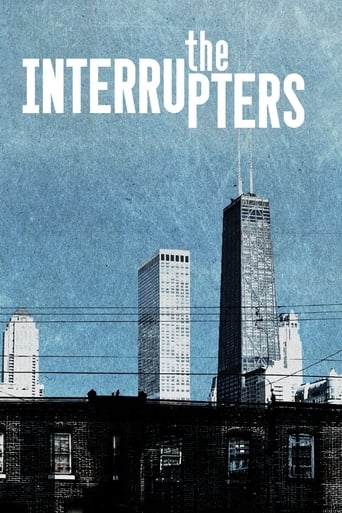



I love this movie so much
Your blood may run cold, but you now find yourself pinioned to the story.
View MoreWhile it doesn't offer any answers, it both thrills and makes you think.
View MoreThis movie tries so hard to be funny, yet it falls flat every time. Just another example of recycled ideas repackaged with women in an attempt to appeal to a certain audience.
View MoreSteve James' documentary The Interrupters opens with audio taken from several different Chicago news sources, reporting "x" number of people murdered in the city, and how an outbreak of gun violence has ripped apart the area as a whole. We then cut to a volunteer organization that takes the courageous act of stepping in at the sight of conflict amongst gang-members, and works to try and prevent yet another death in a city so consumed by heinous crimes. This group is called "the Interrupters," and for the next two hours we witness their invaluable actions.The Interrupters work for an organization called "CeaseFire," and its members are comprised of former gang-members; a positive, being that since they are still young, they can speak the language of the gangs and recall the motives of an underprivileged teenager. While they work entirely for the area of Chicago, much of their time is devoted to bettering Englewood, one of the most broken cities in the entire nation. 98% of Englewood residents are black, with the main age demographic being people under the thirty. With a 25.8% unemployment rate (which has now risen to 44%, roughly two years after the release of this film), the townspeople look towards a life of gangs as a way to earn respect, money, territory, and get a quick-fix for violence and danger. This makes the area especially dangerous, not just for the gang-members of opposing territories, but the residents who want no part in the crime world. Whether you're a gang-member on the front lines of violence, a passive resident, a bystander, or even a young child you're a potential victim to a senseless problem.One of the leading violence interrupters is a bright, young woman named Ameena Mathews. Once an active gang-member, she has since married, converted to being a Muslim, and works to travel around the community promoting a truce and a compromise between opposing forces. When she bravely lectures in the middle of thirty or so gang-members about how there's no reason at all to be dealing or discussing potential crimes when children are arriving home from school, the petite woman herself is open to almost anything. Steve James and his camera crew are as well. Yet Mathews boldly preaches her gospel before traveling on to continue doing more work.Frequently, CeaseFire will hold fiery roundtable meetings, where group members will discuss what fight/argument they've broken up since the last meeting and what leads do they have on any further gang activity. During these meetings, despite several dozens of Interrupters being on the job and prepared for just about anything, it's when we see how grossly outnumbered they are. Keep in mind, Chicago isn't just Englewood, and with a population of over 3,000,000 citizens, the per-capita rate of the CeaseFire members is and will always remain outnumbered. This doesn't make their efforts any less commendable, but with over 500 homicides taken place in a city so torn in 2012, there needs to be more recruiting and soon. How much longer can a city be referred to as names like "Chiraq," and boast a statistic that states it is more violent than Iraq and Afghanistan? Aesthetically, The Interrupters is extraordinary, with several long-shots of the crisp, yet crumbling Chicagoland area. Scarcely has a documentary about going into a real issue been so engrossing visually. Yet what truly makes The Interrupters the captivating, multi-layered documentary that it is is the way it conducts its subjects. Too often do I see documentaries take the path of a scare-tactic gift-wrapped as a formal piece of information. Here, we are presented with nothing but the true homelives of these troubled teenagers and adults, who are not only bearing hard circumstances on their shoulders, but misguided direction, societal neglect, negative perceptions, and shallow stereotypes. Think about the way white people are often associated with being wealthy, pure, and successful, while black people often associated with being deviant, rude, and obnoxious. Are these stereotypes shaping us or are we shaping our stereotypes? This is a bolder question from a documentary, asked naturally, that for once doesn't come from a glaring, empty statistic.One of the smaller, yet more relevant details the film goes into is the significance of rival-gangs and how integrating them in hopes of a "melting pot"-like effect is purely hopeless on all accounts. This is shown when Carver High School, a populated urban school, was rebranded as a military academy, it forced many kids to move to a nearby neighborhood and attend Fenger High School. Carver and Fenger have a notorious gang rivalry occurring, and not long after the schools were integrated, a teenager named Derrion Albert was brutally beaten to death and the beating was captured on a cell phone to be viewed on Youtube.James, who made Hoop Dreams, which is often hailed as one of the best pieces of documentary filmmaking ever, lived a full year in Chicago, and witnessed unforeseeable acts of not just despair and ugliness, but also true bravery. Being in the line of gunfire and danger numerous times, and filming highly-graphic footage with true documentarian impunity shows not only devotion but true commitment to a job. The Interrupters was also co-produced by sociologist Alex Kotlowitz, who wrote the popular novel "There Are No Children Here: The Story of Two Boys Growing Up in the Other America," a profoundly eye-opening book on the lives of inner-city children who live in public housing projects.This is a powerhouse documentary in every sense of the word, emotional, exhilarating, heart-wrenching, and often, very melancholic. It shows that while there's a silver lining of hope reaching the Chicagoland area in terms of a method to eliminate seemingly endless gun violence, it may be too facile to call it a formal "solution" just yet.NOTE: This review was read before my English class, Junior year in high school, in March 2013.
View MoreVery interesting topic and well executed but way too long. I am sure they recorded many more stories as interesting as these that are included but the filmmaker did not include them because the film should not be too long. In my view editing should go further and cut more scenes to make it 80-90 min movie. It would make this film much stronger keeping the essence and prevent viewers from checking their watches. What we get is diluted story and sometimes boring as some scenes are redundant in their message or information. Better editing making this film much shorter would make it much more interesting without scarifying the importance of the story. Overall it is important and interesting documentary.
View MoreThis is a moving and challenging, if rather long, documentary that follows the progress of the interrupters over the course of a year. However, it does not feel too long and the 125min passes surprisingly quickly.The disturbing gang violence and cycle of revenge in Chicago is sensitively rendered; there is no gratuitous detail. The interrupters are trying to intervene, to interrupt the cycle of shootings.But there is hope. Hope in that the interrupters are themselves former gang members who are now working to reduce the violence; and hope in that they build relationships with others, and in their perseverance not only is the cycle of violence interrupted, but the lives of the individuals are changed for the better.Sensitively made, gives a real insight into the situation in Chicago; and offers real hope that a leopard can indeed change its spots.Highly recommended.
View MoreSteve James is a remarkable documentary filmmaker who has given us a series of amazing films starting with Hoop Dreams that explore some of the more difficult issues in our society including race, poverty, crime, and violence. His film on the Trial of Allen Iverson revealed the complex racial discourse at work beneath his hometown of Hampton, VA. His most recent film, The Interrupters, screened today at Austin's SXSW Film Festival. It is a powerful film that captures the plague of urban violence that plagues are cities – in this case Chicago – and goes beyond documenting to show a group of activists (many with troubled pasts) working for a group called Ceasefire. Ceasefire seeks to engage troubled young people and interrupt their dysfunctional behavior patterns of anger, crime, drug use, irresponsibility and violence. The Interrupters are acting heroically to try to save their imploding self-destructive communities. While the footage and the story are compelling, it could still use some editing since at over 2.5 hours it is a little too long. The length is understandable since James filmed over 300 hours, but it still needs to be paired down further to capture a manageable story.The other problem with the film is more complex. The Interrupters are fighting on the front lines in their efforts to save their communities. But the fight that they are engaged in is almost impossible, because their personal and human efforts to save individuals are divorced from a larger political reality. The film is a deeply personal and human, but it fails to address the deeper social problems in education, unemployment that have created the epidemic of violence. They are treating the symptoms of those who are already infected without searching out the causes of the disease.Sadly, the problems of the poor have disappeared from our political discourse since the collapse of the "War on Poverty." The current administration – led by our first urban President in decades - has failed to offer any sort of serious urban or anti-poverty agenda. Our political discourse focuses on the "middle class" and pretends as if poverty doesn't exist. Poverty has ceased to exist on American TV and in most of our news media coverage. Middle Class America has stopped seeing poverty which is quietly hidden away outside of our consciousness. The social contract that binds our society together is broken. We need far more films like the Interrupters to confront the American public with the realities of poverty and violence that are eating away at the soul of our society.Hopefully, many people will watch a film like The Interrupters and ask themselves two questions: What can I do as an individual to help groups like this make a difference in my community? What can I do as a citizen to get my government to act to make the structural changes that are needed to transform these communities?
View More